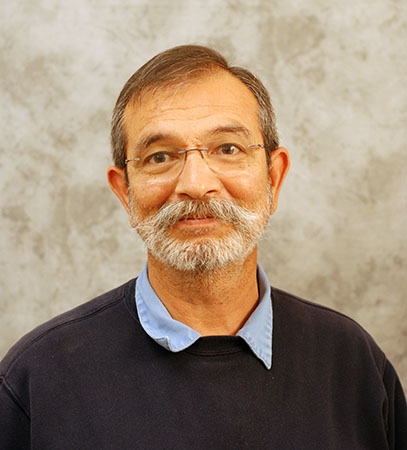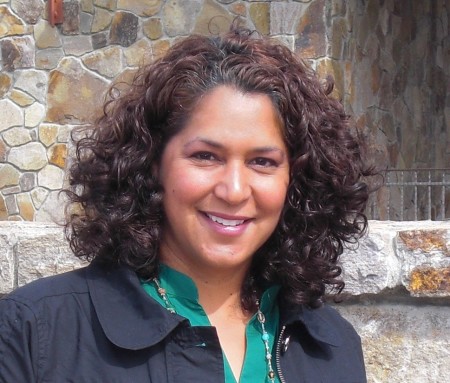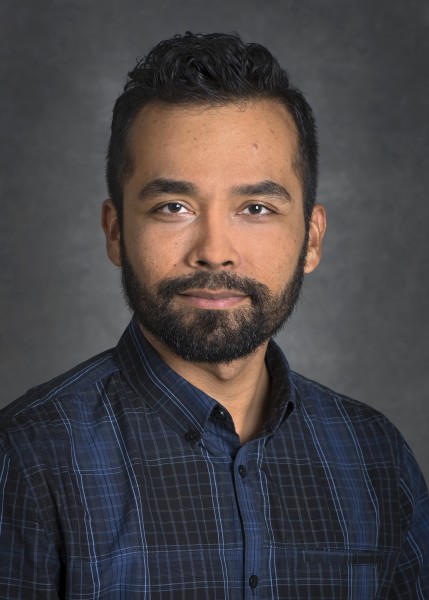National Hispanic Heritage Month is observed each year from Sept. 15 to Oct. 15. The observation started in 1968 as Hispanic Heritage Week under Pres. Lyndon Johnson and was expanded by Pres. Ronald Reagan in 1988 to cover a 30-day period. We profile Michael Botello of Facilities, Rachel Carl of HR, and Javier Ceja-Navarro of EES.
Michael Botello, Lead Plant Maintenance Technician, Facilities
 Growing up in East L.A. in the late 1960s, Michael Botello learned to keep his head down and avoid interaction in his gritty neighborhood. Every week, he would wear “street” clothes over his Boy Scout uniform as he walked the four blocks to his meetings, hoping to avoid drawing attention to himself as he passed gang members.
Growing up in East L.A. in the late 1960s, Michael Botello learned to keep his head down and avoid interaction in his gritty neighborhood. Every week, he would wear “street” clothes over his Boy Scout uniform as he walked the four blocks to his meetings, hoping to avoid drawing attention to himself as he passed gang members.
Botello’s parents, with help from extended family members, somehow scraped together enough money to send all nine of their kids to private Catholic school. He got a good education, but it left him feeling somewhat adrift. “I really grew up without a sense of identity,” Botello says. “I felt outcast from my neighbors and community because I was brought up not to associate with the Mexican-American kids in my neighborhood, a lot of whom were involved in gangs or just generally getting into trouble.”
While Botello attended high school in the late 1960s, the Chicano Civil Rights Movement was emerging in California. The Chicano Moratorium, a movement led by Chicano anti-war activists to oppose the Vietnam War, staged high school walkouts and anti-war marches in L.A. One East L.A. march in 1970 drew 30,000 protestors and led to the historic East L.A. riots. That year, his last year of high school, was a turning point for Botello.
“For me, the Chicano Movement really started a kind of an awakening to the way that the Latino community was treated by the police and the larger society,” says Botello. “But I still felt conflicted and alienated in my own community, even though I had finally embraced who I am as a Mexican-American who appreciates both cultures.”
After high school, Botello experienced another major life turning point when he received a scholarship to attend Johnston College, an “experimental college” on the same campus as University of Redlands. “It sent me into another cultural and economic shock,” he says. “When you’re growing up in a poor neighborhood, you don’t necessarily know any better because everyone around you is like you. At Johnston, I felt like everyone was looking down on me—I was one of only two Latino students, whereas in my high school Latinos had been the majority.”
Still, he credits Johnston College with changing his life. Plus, he was the first child in his family to attend college, which made his parents incredibly happy.
After college Botello followed his girlfriend to the Bay Area, where he enrolled in technical school through a program offered by the California Educational and Training Act (CETA) and trained as a machinist. He was hired at Berkeley Lab in 1977 through CETA. Aside from a few years living in Spain, he’s been at the Lab ever since.
It was in Spain, where Botello went with his Spanish wife so that she could finish medical school, that he finally learned to speak Spanish while also raising his two young daughters as a stay-at-home dad. When the family returned to the Bay Area, he returned to his job at Berkeley Lab. He is now one of the senior members of Facilities and continues to wear multiple hats, filling roles ranging from regulatory compliance to crew management.
Botello says he finally feels like he can appreciate all the aspects of his background, and is proud to call himself a Chicano, a term that isn’t always interpreted so positively by many Latinos. “In Mexico it’s a derogatory term, because you’re not Mexican and you’re not American,” he says. “But that’s the beauty of the idea of the American melting pot: I’m American and I’m Mexican, and I embrace both cultures.”
Botello keeps his cultural heritage alive in his own family—he taught his kids the language, culture, and history of Mexico and the importance of the Catholic religion in Mexico. Art is another avenue that Botello values deeply as a cultural teaching tool, and he’s proud of his brothers, Paul and David Botello, who became influential mural artists and have been key figures in the Chicano Art Movement in L.A. “They’ve helped foster a really beautiful expression of the Chicano culture,” he says.
Rachel Carl, Field Manager, Human Resources
 Despite the fact that her mom had deliberately spoken only English with her since she was a toddler, Rachel Carl was still placed in English as a Second Language (ESL) classes in her 1970s Concord, California elementary school. Even the ESL teacher asked Carl why she was there, given that she spoke perfect English.
Despite the fact that her mom had deliberately spoken only English with her since she was a toddler, Rachel Carl was still placed in English as a Second Language (ESL) classes in her 1970s Concord, California elementary school. Even the ESL teacher asked Carl why she was there, given that she spoke perfect English.
“It was just what they did back then,” explains Carl. “Anyone of Hispanic descent was just automatically placed in those classes.”
Carl’s mom had grown up in Woodland, California, the child of first-generation Mexican immigrants, and didn’t want her children to have the same experiences as she had, speaking Spanish as her first language and having a hard time adjusting in elementary school. The early 1970s was also a time of backlash against foreign-language speakers, Carl recalls.
“I was always aware of being different, because I looked very different than my classmates,” she says. “We were one of three Hispanic families in our area.”
Though Carl enjoyed her social and school life in Concord, it wasn’t until she was in second or third grade that she realized that some of her neighborhood friends weren’t allowed to invite her into their homes because of her skin color. She remembers her family being refused service at restaurants for the same reason, and having neighbors ask them if they spoke English.
Carl’s family was full of “firsts” within her extended family—the first to move from farm and manual labor jobs to civil servant and professional jobs; her parents were the first to divorce, when Carl was 11; and then her mom went on to pursue her college degree, which no one in the extended family understood. Carl credits all of this with giving her a drive to pursue her own education and her work ethic.
“We grew up really poor. With three kids and my mom in school, she had to work multiple odd jobs to make ends meet,” says Carl. “I decided at a very young age that I was going to go to college and work hard so that I would never have to be poor again.”
During her sophomore year in high school, Carl’s family moved to UC Berkeley family housing in Albany Village and Carl started attending Albany High School, which she remembers as both more diverse and more segregated than her school in Concord.
“In Concord, you had your core social group, who were your neighborhood friends, whereas in Albany all the social groups were divided by race,” she says. “There was this intense focus on academics, and it really wasn’t a great experience. But all of these experiences created a foundation for me to be more accepting of differences. I’m definitely much more sensitive to these things.”
When she graduated high school, Carl headed back out towards Concord to attend Diablo Valley College to study Early Childhood Education. She taught preschool for a few years. She transferred to San Jose State a couple years later, all the while holding down multiple jobs.
“In my family, going to college was considered something people of privilege did,” says Carl. “So my dad was not supportive of me going to college and didn’t think it was necessary or useful.”
But Carl did graduate from college and went on to a career in human resources, a field where she’s had the opportunity to build upon her skills in fostering diversity. Carl manages HR staff that support Computing Sciences/IT and Physical Sciences, and she also supervises all the recruiters for the Lab, which is an important area for the Lab to focus on greater diversity and inclusion, she says.
“We have to cast a really wide net in our recruiting efforts,” Carl says. “In our outreach for potential talent and our branding, there are a lot of opportunities to create a more diverse workplace.”
Carl has taken her drive for diversity into her personal life as well. Noticing that there weren’t many women of color in the triathlons and marathons she participates in, she joined an East Bay group, Black Girls Do Bike, which promotes cycling for women of color. She is also an active member of the AIDS/Lifecycle as a cyclist, roadie, and training ride leader and a leader of its NorCal Women’s Program.
Javier Ceja-Navarro, Project Scientist, Earth & Environmental Sciences
Pursuing an education was not a simple task for Javier Ceja-Navarro. Growing up in the small town of Tuxpan in Nayarit state in Mexico, he was always an engaged and curious student who wanted to know more and was fascinated by the natural world. But the educational opportunities in his rural town were limited. So at the age of 15, encouraged by teachers and his family to pursue his passionate interest in chemistry, he left home to go to Tepic and by the age of 18 moved to Celaya, Guanajuato to attend the Instituto Tecnólogico de Celaya.
Leaving home at such a young age wasn’t easy—for Ceja-Navarro nor his family. His mom was a young single mother who worked as a secretary and raised two boys with support from extended family. Only a few members of Ceja-Navarro’s family had gone to college, but that was enough for him to decide to get there and beyond, and they were fully supportive.
“I remember when I told my mom that I wanted to leave our town and go to a different school in another state,” says Ceja-Navarro. Her response was: “OK, I will help you. Let’s figure out how are we going to make this work.”
Support from her and their extended family, as well as a part-time job as a waiter, allowed him to complete his degree in chemical engineering. He then earned his PhD in environmental biotechnology in Mexico City at Cinvestav (the Center for Research and Advanced Studies of the National Polytechnic Institute).
He credits much of his success to the meaningful mentors he’s found at every stage of his education. “There has always been someone who really made a big difference in my life and guided me on to my next step, from my elementary school math teacher to my advisor at university,” says Ceja-Navarro. “Now my goal is to become such a guide for someone else back in Mexico.”
Ceja-Navarro came to UC Berkeley in the final year of his PhD program with a one-year scholarship from the Mexican government to study mitochondria with molecular biologist Antón Vila Sanjurjo at the Bustamante Lab. After concluding his PhD study in 2010, he started as postdoctoral scientist at Berkeley Lab and has been here ever since. “I’ve never stopped learning at the Lab, and now working with Eoin Brodie has brought my scientific creativity to a different level,” he says.
One thing he did find challenging was speaking up and voicing his opinions, though he credits his mentors and colleagues with helping him make huge strides. “My educational experience in Mexico was that you assimilate the knowledge you gain, you become a vessel, but I found myself not as able as others when it came to expressing and voicing my opinions,” says Ceja-Navarro. “It was a real cultural barrier for me in the workplace, but I managed to accomplish a complete change.”.
Though Ceja-Navarro is thoroughly enjoying his time at the Lab and in the Bay Area, he does miss the comforts of home. “I miss my family the most,” he says. “And I miss the warmth of my hometown, and of course my grandmother’s cooking.”
Luckily, his grandmother taught him to make some of his favorite dishes and Ceja-Navarro remains connected to Mexico partly through his own love of cooking, preparing traditional dishes to share with friends around Mexican holidays and festivities.
-Keri Troutman


Wonderful article. I really appreciated the depth of sharing of personal experiences, from which we can all benefit. Thank you Michael, Rachel and Javier for your candor and inspiration.
Thank you Michael, Rachel and Javier for being so open and sharing your story with us. I enjoyed hearing from each of you. Wishing you continued success and happiness.
Excellent Article. And some really outstanding people….thoroughly enjoyed this!